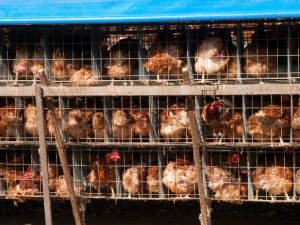Like fast food, Dollar Store and Dollar Tree items are cheap, feel good and offer a temporary fix. Dollar Stores and the concept of buying low quality throwaway plastic goods resonates with everyone but especially with lower income families and people with people of color. A new report finds that 54% of all the products tested at Dollar Stores contain hazardous chemicals linked to cancer, learning disabilities and serious illnesses.
On the eve of the Dollar Tree/Family Dollar annual shareholder meeting, the Campaign for Healthier Solutions – a group of over 200 health, science-based, environmental justice organizations in the United States – released a report about toxic chemicals in products at discount retailers, including Dollar General, Dollar Tree/Family Dollar, 99 Cents Only and Five Below.
The report — Toxic Chemicals in Dollar Store Products: 2021 Results — contains test results from over 200 products such as toys, jewelry, school supplies and other household items. Over half – 54% – contained at least one chemical of concern.
“Once again we have tested products at discount retailers and we are still finding the same harmful chemicals every time. These chemicals disproportionately impact communities of color and low-income neighborhoods. Many of these communities already have multiple exposures because they are located in heavily industrialized areas,” said Jose T. Bravo, National Coordinator for the Campaign for Healthier Solutions.
“Fortunately, Dollar Tree/Family Dollar has expressed interest in cleaning up their supply chain, but Dollar General who this year reported 33 billion dollars in net sales, will not even respond to our requests to discuss the issue.”
BPA in canned foods
The following concerns were identified in the products tested in the new report:
Canned food contained toxic interior coatings that included BPA – a chemical associated with hormone disruption – and polyvinyl chloride (PVC), which can contain plasticizers that are linked to asthma and other lung problems.
Pans and cookware were coated with BPA-based epoxy as well as per- and polyfluoroalkyl substances (PFAS), linked to cancer, low infant birth weights, and immune system problems.
100% of microwave popcorn tested positive for PFAS coatings inside the packaging.
We thought this was behind us 10 years ago, but no. One hundred percent of store receipts contained Bisphenol S (BPS), an unfortunate substitute for BPA with similar health risks. Imagine if you are working at these shops as a cashier?
Consumer electronics contained lead in the solder, a toxic metal that harms brain development and could impact the workers who put these products together. These electronics also contained toxic flame retardants and phthalate plasticizers, linked to birth defects, reduced fertility, cancer, learning disabilities, diabetes, and other health issues.
A variety of products contained other chemicals of concern, including antimony compounds, associated with respiratory irritation and organotins associated with hormone disruption.
Earlier this year, the fifth annual Mind the Store report card was released, ranking 50 companies according to their level of chemical safety in products. Dollar Tree/Family Dollar was one of the most improved, going from a D+ in the last report to a C+ in 2021. Dollar Tree/Family Dollar has met with the Campaign for Healthier Solutions and recently expressed a commitment to clean up their supply chain.
They have also publicly released a chemical policy, a commitment to eliminate priority chemicals, and a pollinator protector policy, and have stated in private that they plan to expand the number of chemicals that they are phasing out, as well as the number of products they will be cleaning up.
“We’re very encouraged with the communication that we’ve had with Dollar Tree/Family Dollar,” said Bravo. “We’ve made a lot of inroads with their chemical policy to protect customers, workers and the company’s bottom line, and encourage other dollar store chains to be just as transparent in their chemical policies and commitments to improve.”
Dollar General, which received a C- grade in the 2021 report card, has not responded to any recent communication from the Campaign for Healthier Solutions about expanding their list of restricted substances and product categories that they are focusing on.
Although Dollar General received positive attention last week for selling fresh groceries at some stores, they halted communication with the AgriCultura Network (ACN) in Albuquerque, a partner of the Campaign for Healthier Solution. During a face-to-face discussion between ACN and Dollar General in 2019, some parameters were set around certifications that ACN needed to become a local vendor. The project has since come to a standstill. This is an important pilot project because it would potentially give Dollar General a source for locally-grown produce and shelf-stable products directly from community gardens.
“Dollar Stores are often the most convenient places for busy families to purchase snacks and meals,” said Helga Garcia-Garza , Executive Director of the AgriCultura Network. “We will not stop fighting until we know these stores are not selling toxic products, including food, especially products targeted for children.”
99 Cents Only Stores have done nothing to phase out toxic chemicals. They have earned an F grade with zero points on the Retailer Report Card for the third year in a row, landing them in the Toxic Hall of Shame.
Many of the products in Five Below stores are targeted toward children. Still, 66% of the products in the new report from Five Below tested positive for at least one chemical of concern. Although Five Below is a new target for the Campaign for Healthier Solutions, the group’s members are hopeful that they will soon be ready to begin eliminating hazardous chemicals from their products.
The good news is that there was some improvement from the Campaign’s 2015 product testing report – A Day Late and a Dollar Short: Discount Retailers are Falling Behind on Safer Chemicals. At that time, 164 products were tested and over 81% contained at least one chemical of concern, including lead in children’s jewelry, which was not found in the latest round of testing.
“We hope discount retailers will phase out these harmful chemicals once and for all,” said Bravo. “Until then, we will continue testing and releasing the results.”




